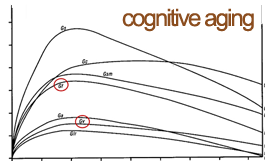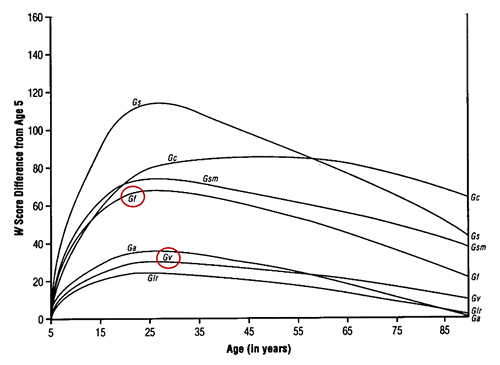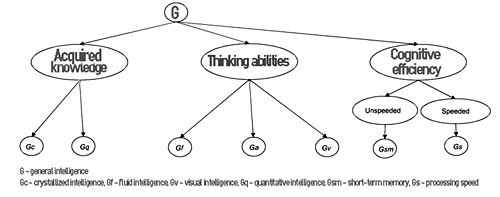
Brain health and brain fitness depends on maintaining our ‘G-Factor’- our general intelligence.
The 5 Factors of Intelligence Defined
Psychologists call general intelligence ‘G’. G is known to be based on five underlying factors (Gc, Gf, Gv, Gsm and Gs) shown below. Some of these factors are based on ‘acquired knowledge’ through education, others are based on ‘raw’ thinking skills that we are usually not taught (such as the ability to reason logically), and others are based on how efficient our brains are (our ‘cognitive efficiency’). We all differ in our strengths and weaknesses in these 5 factors, although they are all linked to our overall ‘G’ level measured by an IQ test.
Our crystallized intelligence (Gc) is the intelligence factor that depends on knowledge and skills gained through experience, education and training. It depends on what we learn from our surrounding culture, and may be tested by vocabulary or general knowledge in IQ tests. Crystallized intelligence tends to remain constant over the lifespan and can even increase by acquiring more knowledge and skills.
Our fluid intelligence (Gf) is our on-the-spot reasoning and problem solving ability, not dependent on background knowledge, education or any specific expertise. It enables us to see relationships and learn quickly in new situations. Our fluid intelligence enables us to fluidly: reason, plan, solve problems, think abstractly – verbally, numerically or spatially, understand complex ideas, analogies & relationships & learn quickly from experience.
Visual intelligence or visual-spatial intelligence (Gv) involves the ability to visualize, remember and manipulate images in the ‘mind’s eye’. This kind of intelligence is measured by tasks that require imagining spatial objects as they change or move through space. It is an important factor of intelligence for professions such as engineering or architecture.
Processing speed (Gs) is how fast your mental processes are – your ability to automatically and fluently perform basic cognitive tasks (such as scanning text for something), especially when high levels of attention and focused concentration are required.
Short term /working memory (Gwm) . This is the memory system that holds in mind a limited amount of information for brief periods. We use our short term memory every day, such as remembering a telephone number or directions while you are driving. We can also mentally transform information in short term memory – to solve a problem, to figure something out, or reason through something to find an answer. This short term memory ability is called working memory.
The dual n-back exercise in the i3 Mindware IQ software directly trains short term/working memory (Gsm). It has been scientifically shown to improve working memory capacity by over 60%.
Quantitative intelligence (Gq) is not an independent factor in itself, but is based on a combination of other IQ factors including Gc, Gf, and Gsm. It is mostly built up during formal educational experiences. Gq is a person’s store of acquired mathematical knowledge and well practiced techniques for solving mathematical and quantitative problems.
How the 5 Factors of Intelligence Change Over the Lifespan
The diagram below shows how our different cognitive abilities change over the lifespan on average in the population. This is from data collected by comparing scores in different age groups on IQ tests that measure the different factors of IQ. Of course, these are average scores, and as an individual you can show a very different pattern.

Speed of processing (Gs) is the most dramatically affected by aging. Fortunately, intelligent decision making and problem solving often does not require processing speed abilities. The cognitive ability that is most resistant to cognitive aging is crystallized intelligence (Gc) – our store of knowledge, information and skills. This continues to grow until the mid 60s.
Prevent Cognitive Aging with i3 IQ Training
Research is ongoing but there is evidence that our i3 software trains and improves Gf and Gwm over the lifespan – both vulnerable to cognitive aging. The training helps maintain brain health and brain fitness.
There is no evidence that cognitive decline is inevitable. Some aspects of intelligence may actually improve with aging.
Small-world cost-efficient brain networks are largely genetically based. They become less cost-efficient with age, and predict IQ.



[…] Is facial recognition a non-g factor mental module? – The Unz ReviewThe 5 Factors of Intelligence Over the Lifespan […]